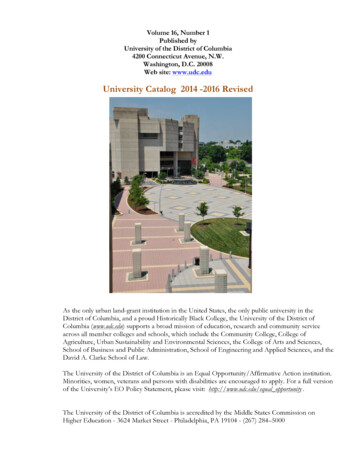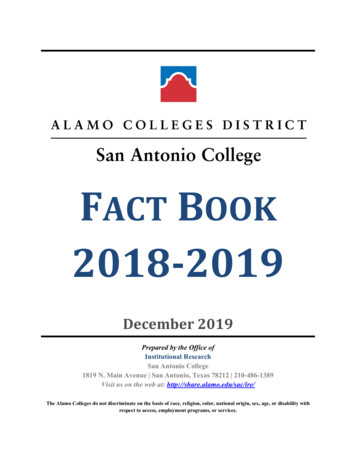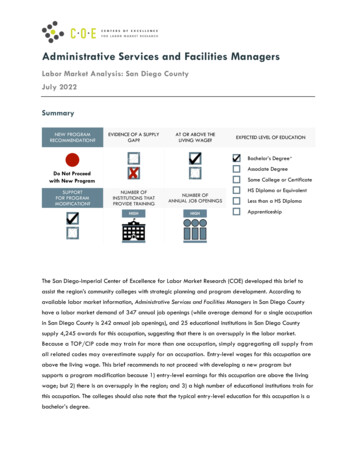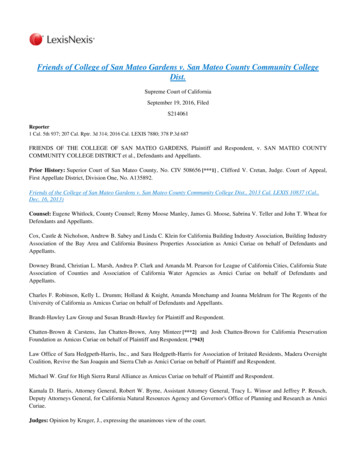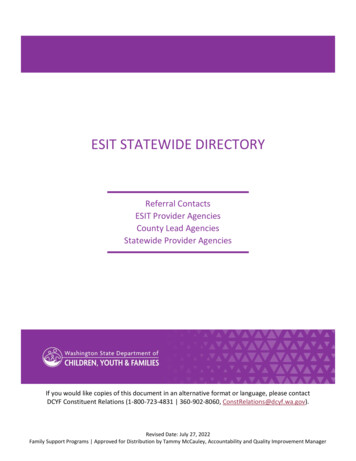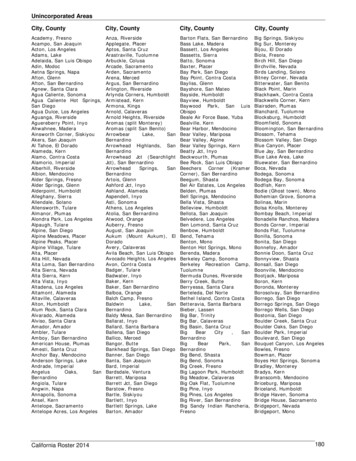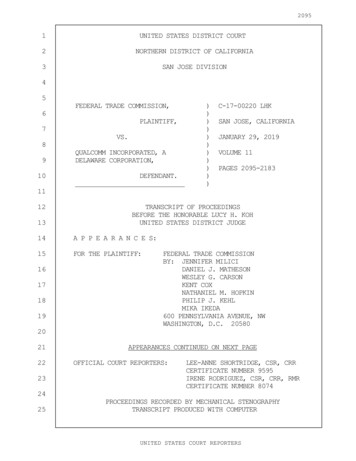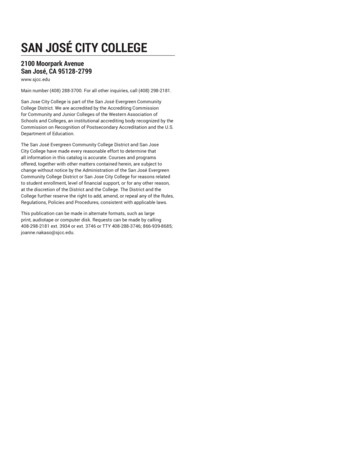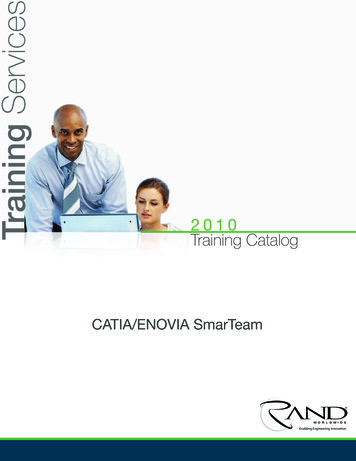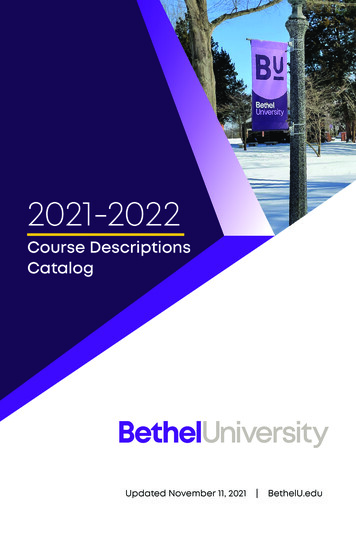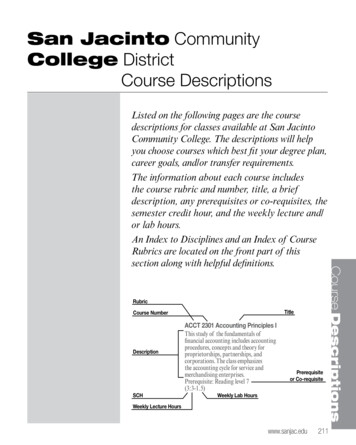
Transcription
San Jacinto CommunityCollege DistrictCourse DescriptionsRubricTitleCourse NumberDescriptionSCHACCT 2301 Accounting Principles IThis study of the fundamentals offinancial accounting includes accountingprocedures, concepts and theory forproprietorships, partnerships, andcorporations. The class emphasizesthe accounting cycle for service andmerchandising enterprises.Prerequisite: Reading level 7(3:3-1.5)Prerequisiteor Co-requisiteWeekly Lab HoursWeekly Lecture Hourswww.sanjac.edu211Course DescriptionsListed on the following pages are the coursedescriptions for classes available at San JacintoCommunity College. The descriptions will helpyou choose courses which best fit your degree plan,career goals, and/or transfer requirements.The information about each course includesthe course rubric and number, title, a briefdescription, any prerequisites or co-requisites, thesemester credit hour, and the weekly lecture and/or lab hours.An Index to Disciplines and an Index of CourseRubrics are located on the front part of thissection along with helpful definitions.
Course DescriptionsCourse DescriptionsIndex to SubjectsAccounting (ACCT, ACNT)Aeronautical Technology (AIRP, AVIM)Agriculture/Agribusiness (AGRI)Air Conditioning Technology (HART)Anthropology (ANTH)Art (ARTS) andVisual Communication (ARTC, ARTS,ARTV, GRPH, IMED, PHTC)Astronomy (PHYS)Audio Engineering-(MUSB, MUSC))Automotive Collision Repair Technology(ABDR)Automotive Technology (AUMT)Biology (BIOL)Business (BCIS, BUSG, BUSI)Business Management (BMGT, BUSG, HRPO,MRKG)Business Office Technology (POFI, POFL,POFM, POFT)Chemistry (CHEM)Child Development/Early ChildhoodEducation (CDEC, FMLD, TECA)College Preparatory (GUST)Communications (COMM)Computer Information Technology (EDTC,GAME, IMED, INEW, ITCC, ITMC,ITMT, ITNW, ITSC, ITSE, ITSW ITSY)Computer Science (COSC)Cosmetology (CSME)Construction Management Technology (CNBT)Criminal Justice (CJCR, CJLE, CJSA, CRIJ)Culinary Arts (CHEF, IFWA, PSTR, RSTO)Dance (DANC)Dental Assisting (DNTA)Diesel Technology (DEMR)Dietetics (DITA, FDNS, HECO, IFWA)Drama (See Theatre and Film)Economics (ECON)Education (EDUC)Electrical Technology (ELPT, IEIR)Electronics Technology (CETT, CPMT, CSIR,EECT, ELMT, FCEL, RBTC)Emergency Medical Technology (EMSP)Engineering (ENGR)Engineering Design Graphics(ARCE, ARTV, DFTG)English (ENGL, HUMA)English for Speakers of Other Languages(ESOL)Environmental Science (ENVR)Eye Care Technology (HPRS, OPTS, POFM)Fire Protection Technology (FIRS, FIRT)Foreign Languages(See Modern Languages)Geography (GEOG)Geology (GEOL)Gerontology Services (GERS)Government (GOVT)Health Information Management(HITT, HPRS)History (HIST)Homeland Security (HMSY)Humanities (HUMA) (See English)Instrumentation Technology (INTC)Interior Design (INDS)International Business, Logistics, and Maritime(IBUS, LMGT, and MART)Journalism (See Communications)Long Term Care Administration (LTCA)Massage Therapy (MSSG)Mathematics (MATH)Medical Assisting (MDCA)Medical Imaging Technology (CTMT,DMSO,DSVT, MAMT MRIT, RADR, )Medical Laboratory Technology(HPRS, MLAB, PLAB, SCIT)Mental Health Services (CMSW, DAAC,SCWK, SOCW, PMHS, PSYT)Mexican American Studies (HUMA)Military Science (AFSC, MSCI)Modern Languages(CHIN, FREN, GERM, SPAN)Music (MUSI, MUAP, MUEN)Non-Destructive Testing Technology (METL,NDTE, QCTC, WLDG)Nursing (RNSG)Occupational Health and Safety Technology(EPCT, OSHT)Paralegal (LGLA)Pharmacy Technician (PHRA)Philosophy (PHIL)Physical Education/Health Education (PHED)Physical Therapist Assistant (PTHA)Physics (PHYS)Pipefitting (PFPB)Plumbing (PFPB)Process Technology(CBFM, CTEC, INMT, PTAC, PTRT,SCIT)Psychology (PSYC)Public Service Administration (PBAD)Reading (READ)Real Estate (RELE)Respiratory Care (HPRS, RSPT)Restaurant Management (See Culinary Arts)Sheet Metal (MCHN)Sociology (SOCI)Speech (SPCH)Surgical Technology (HPRS, SRGT)Theatre and Film (DRAM)Truck Driving (Commercial) (CVOP)Video and Film Production (COMM)Visual Communication(See Art and Visual Communication)Vocational Nursing (VNSG)Welding Technology (WLDG)An alphabetic prefix called a rubric, usually containing four characters, is used to designate the subject area of the course or department through which thecourse is offered.Each course is given a four-character numeric code, called the course number. The first digit denotes the academic level or year in which college-levelcourses are usually taken. The number “1” indicates freshman or first-year courses; the number “2” indicates sophomore or second-year courses. Whenthe first number is “0,” the course is College Preparatory level. The second digit represents the semester credit hour (SCH) value of the course. The third andfourth digits are for departmental sequencing and make the course number unique within the subject area of the department. Consecutive numbers are notalways used; however, in general, higher numbers are used for the more advanced courses while lower numbers are used for less advanced courses.Numbers in parentheses at the end of each course description indicate the following: first digit, semester credit hours; second digit, lecture hours per week;third digit, laboratory hours per week. A capital letter “A,” indicates Tech-Prep articulation.212www.sanjac.edu
Course DescriptionsIndex of Course LFDNSFIRSFIRTFMLDFRENGAMEProgramCriminal JusticeElectronics Technology CPDCosmetologyProcess TechnologyMedical Imaging TechnologyCulinary ArtsTruck Driving (Commercial) CPDMental Health ServicesDanceDiesel TechnologyEngineering Design GraphicsDieteticsMedical Imaging TechnologyDental AssistingTheatre and FilmMedical Imaging TechnologyEconomicsComputer Information TechnologyEducationElectronics TechnologyElectronics TechnologyElectrical TechnologyElectrical TechnologyInstrumentation TechnologyElectrical TechnologyEmergency Medical TechnologyElectrical TechnologyEnglishEngineeringEnvironmental ScienceOccupational Health and SafetyTechnologyEnglish for Speakers ofOther LanguagesElectronics TechnologyDieteticsFire Protection TechnologyFire Protection TechnologyChild Development/Early ChildhoodEducationFrenchComputer Information erontology Services CPDGovernmentVisual CommunicationCollege PreparatoryAir Conditioning TechnologyDieteticsHistoryHealth Information ManagementInternational Business, Logistics &MaritimeHomeland SecurityEye Care TechnologyHealth Information ManagementMedical Laboratory TechnologyRespiratory CareSurgical TechnologyBusiness ManagementHumanitiesInternational Business, Logistics &MaritimeElectrical Technology CPDCulinary ArtsDieteticsComputer Information TechnologyVisual CommunicationInterior DesignProcess TechnologyComputer Information TechnologyProcess TechnologyInstrumentation TechnologyComputer Information TechnologyComputer Information TechnologyComputer Information TechnologyComputer Information TechnologyComputer Information TechnologyComputer Information TechnologyComputer Information TechnologyComputer Information Technologywww.sanjac.edu213Course DescriptionsProgramAutomotive CollisionRepair TechnologyACCT AccountingACNT AccountingAGRIAgriculture/AgribusinessAFSC Military ScienceAIRPAeronautical Technology(Aircraft Pilot)ANTH AnthropologyARCE Engineering Design GraphicsARTC Visual CommunicationARTC Engineering Design GraphicsARTS ArtARTS Visual CommunicationARTV Engineering Design GraphicsARTV Visual CommunicationAUMT Automotive TechnologyAVIM Aeronautical Technology(Aviation Management)BCISBusinessBIOLBiologyBMGT Business ManagementBUSG BusinessBUSG Business ManagementBUSIBusinessBUSIBusiness ManagementCBFM Process TechnologyCDEC Child Development/EarlyChildhood EducationCETT Electronics TechnologyCHEF Culinary ArtsCHEM ChemistryCHINChineseCJCR Criminal JusticeCJLE Criminal Justice Law EnforcementCJSA Criminal JusticeCMSW Mental Health ServicesCNBT Construction ManagementTechnologyCOMM Communications/ JournalismCOMM Video and Film ProductionCOSC Computer ScienceCPMT Electronics Technology
Course nal Business, Logistics &MaritimeLTCA Long Term Care AdministrationMAMT Medical Imaging TechnologyMARA Maritime AdministrationMART International Business, Logistics &MaritimeMATH MathematicsMDCA Medical AssistingMCHN Sheet MetalMETL Non-Destructive Testing TechnologyMLAB Medical Laboratory TechnologyMRIT Medical Imaging TechnologyMRKG Business ManagementMRMT Business Office TechnologyMSCI Military ScienceMSSG Massage TherapyMUAP MusicMUSB Audio EngineeringMUSC Audio EngineeringMUSI MusicMUEN MusicNDTE Non-Destructive Testing ogramEye Care TechnologyOccupational Health andSafety TechnologyPublic Service Administration CPDPipefitting CPDPlumbing CPDPhysical Education/HealthEducationPhilosophyPharmacy TechnicianVisual CommunicationPhysicsMedical Laboratory TechnologyMental Health ServicesBusiness Office TechnologyBusiness Office TechnologyBusiness Office TechnologyBusiness Office TechnologyCulinary Arts/Restaurant ManagementPsychologyMental Health ServicesProcess TechnologyPhysical Therapist GProgramProcess TechnologyNon-Destructive Testing TechnologyWelding TechnologyMedical Imaging TechnologyElectronics TechnologyReadingReal EstateNursing (RN)Respiratory CareCulinary ArtsMedical Laboratory TechnologyProcess TechnologyMental Health ServicesSociologyMental Health ServicesSpanishSpeechSurgical TechnologyChild Development/EarlyChildhood EducationVocational NursingWelding TechnologyNon-Destructive Testing TechnologyCourse DescriptionsDEFINITIONS:Course Number: A four letter rubric (subject) and four digit number: SUBJ 1234. First digit “0” indicates College Preparatory, “1” indicates freshman level; “2”indicates sophomore level. Second digit indicates number of semester hours of credit. Third and fourth digits uniquely identify the course.Course Title: Descriptive Title for TranscriptDescription: A short description of the course content.Course Prerequisites: Courses or basic skill levels as defined by Texas Success Initiative required before enrollment.(SCH:LEC-LAB): SCH Semester credit hours of the course; LEC Lecture contact hours per week for a 16-week course; LAB Lab contact hours in a16-week course.214www.sanjac.edu
Course DescriptionsAccountingACCT 2301 Accounting Principles IThis study of the fundamentals of financialaccounting includes accounting procedures,concepts, and theory for proprietorships,partnerships, and corporations. The classemphasizes the accounting cycle for service andmerchandising enterprises. Prerequisite: Readinglevel 7 (3:3-1.5)ACCT 2302 Accounting Principles IIThis study of the fundamentals of managerialaccounting emphasizes accounting for amanufacturing concern. Topics include budgeting,planning, and management decision making.Prerequisite: ACCT 2301 (3:3-1.5)ACNT 1303 Introduction to Accounting IThis course focuses on analyzing, classifying,and recording business transactions in a manualand computerized environment. Emphasis ison understanding the complete accountingcycle and preparing financial statements, bankreconciliations, and payroll. (ACNT 1303 maynot count for degree or certificate purposesif the student receives credit for ACCT 2301.)ACNT 1303 and 1304 will not satisfy thebusiness administration transfer program degreeaccounting requirements. (3:3-0)ACNT 1311 Introduction to ComputerizedAccountingThis course provides an introduction to utilizingthe computer in maintaining accountingrecords, making management decisions, andprocessing common business applications, withprimary emphasis on a general ledger packageand spreadsheet applications. Typical areascovered include the general ledger, accountspayable, accounts receivable, and payroll. It isrecommended that students have prior knowledgeand/or experience in accounting. (3:3-0)ACNT 1331 Federal Income Tax: IndividualThis course provides basic instruction in the taxlaws as currently implemented by the InternalRevenue Services and in tax preparation for theindividual and sole proprietorship. Prerequisite:Reading level 4 (3:3-0)ACNT 2303 Intermediate Accounting IThe focus of this course is critical analysisof generally accepted accounting principles,concepts, and theory underlying the preparationof financial statements. Emphasis is on currenttheory and practice. Prerequisite: ACCT 2301(3:3-0)ACNT 2304 Intermediate Accounting IIThe focus of this course is in-depth analysisof generally accepted accounting principlesunderlying the preparation of financialstatements, including comparative analysis andstatement of cash flow. Prerequisite: ACCT 2301(3:3-0)ACNT 2309 Cost AccountingThis course focuses on budgeting and costcontrol systems, including a detailed study ofmanufacturing cost accounts, and reports, joborder costing, and process costing. It includesan introduction to alternative costing methodssuch activity-based and just-in-time costing.Prerequisite: ACCT 2302 or equivalent (3:3-0)ACNT 2366 Practicum-AccountingThis course offers practical general trainingand experiences in the workplace. The College,with the employer, develops and documents anindividualized plan for the student. The planrelates the workplace training and experiences tothe student‚ general and technical course of study.The guided external experiences may be paid orunpaid. The course may be repeated if topics andlearning outcomes vary, but no more than threetimes for credit. Prerequisite: ACCT 2301 and2302 or approval of department chair. (3:0-21)AeronauticalTechnologyAIRP 1215 Private FlightThis is flight training to prepare the studentfor the completion of the Federal AviationAdministration (FAA) private pilot certificate,including dual and solo flight, in which studentspractice specific maneuvers and cross- countrynavigation. Prerequisite: Reading level 6.Prerequisite or co-requisite: Federal AviationRegulation Part 141, Ground School Trainingand Aeronautical Department chair approval(AIRP 1301, AIRP 1307, and AIRP 1311) (2:1-3)AIRP 1255 Intermediate Flight(Commercial Pilot)This course provides students with flighthours and skills necessary to meet solo crosscountry requirements for the FAA CommercialPilot, single-engine land, airplane certificate.Prerequisite: AIRP 1215 or valid Private PilotCertificate. Reading level 6. Prerequisite orco-requisite: AIRP 2250 and Aeronauticaldepartment chair approval (2:1-2)AIRP 1301 Air NavigationStudents receive instruction in visual flightnavigation rules in the National Airspace System.Topics include sectional charts, flight computers,plotters, and navigation logs and publications. Itqualifies as part of a program leading to FederalAviation Administration certification. One ofthree Private Pilot Ground School courses.(3:3-0)AIRP 1307 Aviation MeteorologyThis course provides in-depth coverage ofmeteorological phenomena affecting aircraftflight. Topics include basic concepts of aviationmeteorology in the study of temperature,pressure, moisture, stability, clouds, air masses,fronts, thunderstorms, icing, and fog. It alsoincludes analysis and use of weather data for flightplanning. It qualifies as part of a program leadingto FAA certification, and is one of three PrivatePilot Ground School courses. (3:3-0)AIRP 1311 Flight TheoryThis course provides instruction in basic flightinformation of the National Aerospace System.Topics include publications, regulations,aircraft systems, and performance. Qualifies aspart of a program leading to Federal AviationAdministration certification and is one of threeprivate pilot ground school courses. (3:3-0)www.sanjac.edu215Course DescriptionsACNT 1304 Introduction to Accounting IIThis course focuses on accounting formerchandising, notes payable, notes receivable,valuation of receivables and equipment, andvaluation of inventories in a manual andcomputerized environment. Prerequisite: ACNT1303 (ACNT 1304 may not count for degree orcertificate purposes if the student receives creditfor ACCT 2301.) ACNT 1303 and 1304 willnot satisfy the business administration transferprogram degree accounting requirements. (3:3-0)ACNT 1329 Payroll and Business TaxAccountingThis is a study of payroll procedures, taxingentities, and reporting requirements of local,state, and federal taxing authorities in a manualand computerized environment. Prerequisite:Reading level 4 (3:3-0)
Course DescriptionsAIRP 1341 Advanced Air NavigationThis course helps students develop advancedairplane systems and performance skills, includingradio navigation and cross-country flightplanning. Includes an introduction to instrumentflight operations and navigation. This coursemay be used as part of a program leading toFAA certification. Prerequisite: AIRP 1301, or aPrivate Pilot Certificate (3:3-0)AIRP 2243 Flight Instructor-MultiengineAirplaneThe flight instruction in this course is necessary toqualify for the FAA Flight Instructor-MultiengineAirplane Rating. It includes combined groundand flight instruction and analysis of flightmaneuvers. Prerequisites: Private, Commercial,Instrument, Multi- engine and Flight InstructorCertificates Reading level 6 (2:1-2)AIRP 1343 AerodynamicsThis is a study of the general principles of thephysical laws of flight. Topics include physicalterms and the four forces of flight: lift, weight,thrust, and drag. Aircraft design, stability control,and high-speed flight characteristics are alsoincluded. Prerequisite: Math level 7 (3:3-0)AIRP 2250 Instrument Flight (InstrumentPilot)This course prepares students for completion ofthe FAA Instrument Pilot Rating with masteryof all instrument flight procedures. Prerequisites:AIRP 1215 or a valid Private Pilot Certificateand Aeronautical Department chair approval.Prerequisite: Reading level 6. Prerequisite or corequisite: FAR Part 141 ground school training(AIRP 1451) (2:1-3)AIRP 1345 Aviation SafetyThis course is a study of the fundamentalsessential to the safety of flight. This is a survey ofthe aviation industry including decision-makingfactors, accident reporting, accident investigation,air traffic systems, and aircraft technologies.(3:3-0)Course DescriptionsAIRP 1347 Human Factors in AviationThis course provides instruction in flightphysiology, the decision-making process, pilothealth maintenance, psychological aspects offlight, human behavior as related to the aircraftflight deck, and aeronautical information ofsignificance to flight crews. (3:3-0)AIRP 1451 Instrument Ground SchoolThis is a study of basic instrument radio andnavigation fundamentals used in instrumentflight. Topics include a description andpractical use of aerial navigation systemsand instruments, charts used for instrumentflight, and FAA regulations. It qualifies as partof a program leading to FAA certification.Prerequisite: AIRP 1341. (4:4-0)AIRP 2239 Commercial Flight(Commercial Pilot)The flight instruction in this course is necessaryto qualify for the FAA Commercial PilotCertificate. Instruction includes both dual andsolo flight training to prepare the student formastery of all commercial pilot maneuvers.Prerequisite: AIRP 2337 (2:1-3)AIRP 2242 Flight Instructor-InstrumentAirplaneThis course helps flight instructors develop theskills necessary to qualify for the FAA CertifiedFlight Instructor Instrument Rating includingairplane single-engine landing. Prerequisites:Flight Instructor and Instrument PilotCertificates, Reading level 6, and AeronauticalDepartment chair approval. (2:2-0)216www.sanjac.eduAIRP 2251 Multi-Engine FlightThis course is preparation for the multiengineclass rating, which will be added to a currentpilot certificate. It includes explanation anddemonstration of all required FAA normaland emergency operations and procedures.Prerequisites: AIRP 1215, AIRP 1255, AIRP2239, and AIRP 2250 or Private or CommercialPilot Certificate and Instrument Pilot Ratingand Aeronautical Department chair approval.Reading level 6 (2:2-0)AIRP 2331 Advanced MeteorologyThis course prepares advanced aviation studentsto apply knowledge of varying meteorologicalfactors (including weather hazards to flight)to flight. It teaches techniques for minimizingweather hazards and for using aviation weatherservices. Prerequisite: AIRP 1307 (3:3-0)AIRP 2333 Aircraft SystemsThis course is a study of the general principles,operation, and application of pneumatic,hydraulic, electrical, fuel, environmental,protection, and warning systems. Emphasis onsubsystems and control systems. (3:3-0)AIRP 2336 Certified Flight InstructorAirplaneThis flight instruction is necessary to qualify forthe FAA Certified Flight Instructor-AirplaneCertificate. Topics include ground and flightinstruction. Prerequisite: Commercial PilotCertificate and Instrument Pilot Rating andAeronautical Department chair approval Readinglevel 6 (3:2-3)AIRP 2337 Commercial Ground SchoolThis is a study of advanced aviation topicsthat can be used for FAA certification at thecommercial pilot level. It includes preparationfor the FAA Commercial Airplane written test.Prerequisites: AIRP 1301, AIRP 1307, and AIRP1311; or a Private Pilot Certificate (3:3-0)AIRP 2352 Practical Dispatching IThis is a study of advanced concepts in weight andbalance, performance calculations, avionics, andengine and airplane specifications, including FAAregulations. Preparation for the FAA AircraftDispatcher includes a written examination.(3:3-0)AIRP 2353 Practical Dispatching IIThis is a study of the duties and responsibilitiesrequired of an aircraft dispatcher. Topics includeinstruction in FAA regulations; flight planning;and company operations, both domestic andinternational. Preparation for the FAA PracticalExamination is also included. Students must beat least 22 1/2 years old to take the FAA AircraftDispatcher exam. Prerequisite or co-requisite:AIRP 2352 (3:3-1)AIRP 2355 Propulsion SystemsThis course provides in-depth coverage of aircraftengine theory and principles of operation ofvarious types of aircraft engines, includingreciprocating, turboprop, turbojet, and turbo fan.Topics include propellers, superchargers, engineaccessories, control, and instrumentation. (3:3-0)AIRP 2357 Turbine Aircraft SystemsGround SchoolThis course provides instruction in the systems ofspecific turbine aircraft. Emphasis is on the "glasscockpit," auxiliary power, aircraft systems, andthe first officer’s operational role. Prerequisite:AIRP 2355 (3:3-0)AVIM 1301 Introduction to AviationManagementAn introduction to small aviation businessmanagement, this course emphasizes financialmarketing, human resources, and administrativeand information systems essential for successfulbusiness operations. (3:3-0)AVIM 2331 Airline ManagementThis is an examination of the organization,operation, and management of airlines. Topicsinclude financing, aircraft selection, route feasibilitystudies, load factors, and marketing. (3:3-0)
Course DescriptionsAVIM 2335 Airport ManagementThis is a study of the major functions ofairport management, including facilitiesand services, organization, human resources,maintenance, planning and zoning, operations,revenues and expenses, public relations, ecology,and safety. (3:3-0)AVIM 2337 Aviation LawThis course is a study of domestic andinternational aviation law including the historicaldevelopment of aviation law, with in-depthcoverage of constitutional, criminal, civil,common, and international law as related toaviation activities. (3:3-0)AVIM 2339 Aviation MarketingThis is a study of significance and functions ofairline marketing, including market research,sales, advertising and promotion, traffic demandanalysis, and price determination theory. (3:3-0)AgricultureAGRI 1131 The Agricultural IndustryThis course is an overview of world agriculture,nature of the industry, resource conservation,and the American agricultural system, includingproduction, distribution, and marketing.Prerequisite: Reading level 6 (1:1-0)AGRI 1315 HorticultureThis course covers structure, growth anddevelopment of horticultural plants from apractical and scientific approach. Includesenvironment effects, basic principles ofpropagation, greenhouse and outdoorproduction, nutrition, pruning, chemical controlof growth, pest control, and landscaping.Prerequisite: Reading level 6 (3:3-0)AGRI 1319 Introductory Animal ScienceThis course covers scientific animal agriculture.Includes importance of livestock and meatindustries; selection, reproduction, nutrition,management, and marketing of beef cattle, swine,sheep, goats, and horses. Prerequisite: Readinglevel 6 (3:2-2)AGRI 1407 AgronomyThis course covers principles and practices inthe development, production, and managementof field crops including plant breeding, plantdiseases, soils, insect control and weed control.Prerequisite: Reading level 6 (3:3-0)AGRI 2317 Introduction to AgriculturalEconomicsThis course covers the fundamental economicprinciples and their applications to the problemsof the industry of agriculture. Prerequisite:Reading level 7, Writing level 7, Math level 7(3:3-0)AGRI 2321 Livestock Evaluation IThis course focuses on selection, evaluation, andclassification of livestock and livestock products.Prerequisite: Reading level 7 (3:3-0)AirConditioningTechnologyHART 1356 EPA Recovery CertificationPreparationThis course covers certification training for HVACrefrigerant recovery and recycling. Instructionwill provide a review of EPA guidelines forrefrigerant recovery and recycling during theinstallation, service, and repair of all HVAC andrefrigeration systems. (3:3-0)HART 1401 Basic Electricity for HVACThis course focuses on principles of electricity asrequired by HVAC, including proper use of testequipment, electrical circuits, and componenttheory and operation. (4:3-3)HART 1407 Refrigeration PrinciplesThis is an introduction to the refrigerationcycle, basic heat transfer theory, temperature/pressure relationship, refrigeration handling, andcomponents and safety. (4:3-3)HART 1441 Residential Air ConditioningThis is a study of components, applications,and installation of mechanical air conditioningsystems. Topics include operating conditions,troubleshooting, repair, and charging of airconditioning systems. Prerequisites: HART1401 and HART 1407 or department chairapproval (4:3-3)HART 1445 Gas and Electrical HeatingThis is a study of the procedures and principlesused in servicing heating systems includinggas-fired furnaces and electric heating systems.Prerequisites or co-requisites: HART 1401 andHART 1407 or department chair approval (4:3-3)HART 2301 Air Conditioning andRefrigeration CodesThis course focuses on HVAC standards andconcepts, with emphasis on understanding anddocumenting the codes and regulations requiredfor a state mechanical contractors license andcompliance with local codes. Prerequisite: HART1441 or department chair approval (3:3-0)HART 2302 Commercial Air ConditioningSystem DesignThis is an advanced study in essential elementsof commercial air conditioning contracting,including duct systems design and/or materialtakeoff, weight estimating, equipment selection,using manufacturer's catalog data, job costestimating, scheduling preparation of shopdrawings, and submittals. Prerequisites: HART2345 and HART 2441 or department chairapproval (3:3-0)HART 2334 Advanced A/C ControlsThis course focuses on the theory and use ofelectrical control devices, electromechanicalcontrols, and/or pneumatic controls.Prerequisites: HART 2431 and HART 2441 ordepartment chair approval (3:3-0)HART 2343 Industrial Air ConditioningThis is a study of components, accessories,applications, and installation of air conditioningsystems above a 25 ton capacity. Prerequisites:HART 2441 and HART 2431 or departmentchair approval (3:3-0)HART 2345 Residential A/C SystemDesignStudents study the properties of air and results ofcooling, heating, humidifying or dehumidifying.They also learn to make heat gain or heat losscalculations necessary for equipment selection andbalancing air systems. Prerequisites: HART 1441and HART 1445 or department chair approval(3:3-0)HART 2368 Practicum (or FieldExperience) - HVAC/R Technology/TechnicianThis course offers practical general workplacetraining through individualized learning plansdeveloped by the employer, the College, and thestudent. Prerequisites: Completion of 20 semesterhours of air conditioning courses, an interview,and department chair approval are required priorto internship assignment (3:0-21)www.sanjac.edu217Course DescriptionsAGRI 1309 Computer in AgricultureThis course focuses on the use of computers inagricultural applications. Includes introductionto programming languages, word processing,electronic spreadsheets, and agricultural software.Prerequisite: Reading level 6 (3:3-0)AGRI 2313 Plant ProtectionThis course covers principles and practicesof controlling and preventing economic losscaused by plant pests. Includes instruction inentomology, plant pathology, weed science, cropscience, environmental toxicology, and relatedenvironmental protection measures. Prerequisite:Reading level 7 (3:2-2)
Course DescriptionsHART 2431 Advanced ElectricityThis course provides advanced electricalinstruction and skill building in installation andservicing of air conditioning and refrigerationequipment, including detailed instruction inmotors and power distribution motors, motorcontrols, and applications of solid state devices.Prerequisite: HART 1441, HART 1445 ordepartment chair approval (4:3-3)HART 2434 Advanced A/C ControlsThis course covers methods for troubleshootingelectrical control devices and control circuits,including corr
Description: A short description of the course content. Course Prerequisites: Courses or basic skill levels as defined by Texas Success Initiative required before enrollment. (SCH:LEC-LAB): SCH Semester credit hours of the course; LEC Lecture contact hours per week for a 16-week course; LAB Lab contact hours in a 16-week course.

